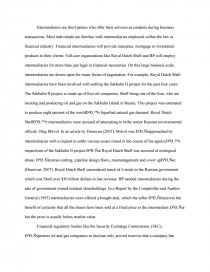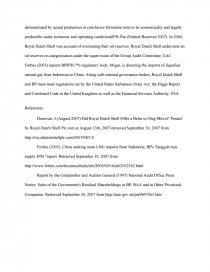Intermediarires for Shell and Bp
Essay by review • June 22, 2011 • Research Paper • 494 Words (2 Pages) • 1,229 Views
Intermediaries are third parties who offer their services as conduits during business transactions. Most individuals are familiar with intermediaries employed within the law or financial industry. Financial intermediaries will provide insurance, mortgage or investment products to their clients. Full-size organizations like Royal Dutch Shell and BP will employ intermediaries for more than just legal or financial necessities. On this large business scale, intermediaries are drawn upon for many forms of negotiation. For example, Royal Dutch Shell intermediaries have been involved with settling the Sakhalin II project for the past four years. The Sakhalin II project is made up of four oil companies, Shell being one of the four, who are locating and producing oil and gas on the Sakhalin Island in Russia. This project was estimated to produce eight percent of the world’s liquefied natural gas demand. Royal Dutch Shell’s intermediaries were accused of attempting to bribe senior Russian environmental official, Oleg Mitvol. In an article by Donovan (2007), Mitvol was “approached by intermediaries with a request to settle various issues raised in the course of his agency’s inspections of the Sakhalin II project.” Royal Dutch Shell was accused of ecological abuse, “corner-cutting, pipeline design flaws, mismanagement and cover up” (Donovan, 2007). Royal Dutch Shell surrendered much of it stock to the Russian government which cost Shell over $30 billion dollars in lost revenue. BP needed intermediaries during the sale of government owned residual shareholdings. In a Report by the Comptroller and Auditor General (1997) intermediaries were offered a bought deal, which the seller “receives the benefit of certainty that all the shares have been sold at a fixed price to the intermediary,” but the price is usually below market value.
Financial regulatory bodies like the Security Exchange Commission, (SEC), “permits oil and gas companies to disclose only proved reserves that a company has demonstrated by actual production or conclusive formation tests to be economically and legally producible under economic and operating conditions” (Federal Reserves 2007). In 2004, Royal Dutch Shell was accused of overstating their oil reserves. Royal Dutch Shell underwent an oil reserves re-categorization under the supervision of the Group Audit Committee,
...
...

